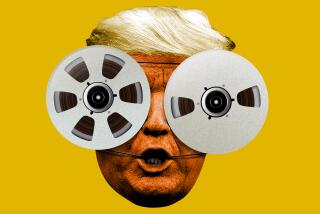Bad News Is Tolerable, the Bumbling Isnât
The good news for President Reagan in the Tower Commission report on the Iran arms scandal is that the bad news wasnât that bad.
True, Reagan took some very tough hits. The commission didnât accept his claim that the arms deal wasnât primarily aimed at freeing American hostages. And it said that his hands-off management of foreign policy allowed National Security Council staff members to run amok. But this is familiar criticism--exactly what the press has been saying for months. Reagan can survive it.
What he couldnât have survived was an assault on his honesty and integrity. If the commission had concluded that Reagan had been purposely lying to investigators and the American people about the arms deal and the diversion of proceeds to the Nicaraguan contras , the country would instantly be faced with a scandal of Watergate proportions. Lying, after all, is what ultimately doomed Richard M. Nixon.
But the commission concluded the opposite about Reagan. It found no smoking gun. The President didnât intend âto mislead the American people or cover up unlawful conduct,â the report says. Thus, the overriding message from the commission is that Reagan acted wrongly in wooing Iran with arms, but that the scandal isnât Watergate.
In fact, the commission all but vindicated the President on a key point: What did he know about the diversion of money to the contras, and when did he know it? Sending government funds to the contras was clearly illegal at the time (it isnât now). Had the commission found that Reagan approved the diversion or even knew about it without taking steps to halt it, he would now be trapped as surely as Nixon was by the evidence in the tapes.
The commission, however, supported the Presidentâs contention that he didnât learn of the contra connection until Nov. 25, the day on which Atty. Gen. Edwin Meese III disclosed it publicly. âNo evidence has come to light to suggest otherwise,â the report says. Besides, notes from Meeseâs interrogation of Lt. Col. Oliver L. North, the NSC official who allegedly sought to channel the money to the contras, show North saying that only he, former National Security Adviser Robert C. McFarlane and McFarlaneâs successor, Admiral John M. Poindexter, knew. But not Reagan.
This doesnât fully clear Reagan on this point, but it helps. The final verdict wonât come until North and Poindexter are granted immunity and testify, on national television, before the congressional committees investigating the scandal. But at the least the report shows which way the evidence points--in Reaganâs favor.
For Reagan the worst thing about the commission was not anything that it said but the Presidentâs own conduct in dealing with the commissioners. He gave them three different answers to the question of when he initially approved arms shipments to Iran. Then, in introducing the three at a press conference on Thursday, he was barely able to get through his prepared statement. He looked unsure of himself.
In the publicâs mind, what may linger is not the report but the Presidentâs display of fuzziness. This could only reinforce the impression that Reagan isnât in charge of his own Administration. He first told the commissioners that he approved the arms sale before the shipment was sent in August, 1985. Then, in a second session, he said that he didnât approve any shipments until after the first one had been sent. Finally he gave the commission a letter saying that he just plain didnât remember.
To make matters worse, Reagan asked a group of business leaders at the White House on Tuesday if any of them could remember what they were doing on Aug. 8, 1985. Not a hand went up. âI think itâs possible to forget,â Reagan said.
Yes, but quick recall wasnât the point, as TV and newspaper commentators quickly pointed out. Reagan has a staff to refresh his memory. He has a log of his activities to remind him what he was up to on that day. Moreover, itâs the sort of decision that youâd expect someone to remember. It involved the lives of hostages and important questions of foreign policy. Still, Reagan now says that he draws a blank.
To gauge the condition of the Reagan presidency, both the report and the Presidentâs recent performance must be taken into account. The report says that there was wrongdoing, but that the worst of it--the doctoring of a White House chronology of the entire affair, for example--didnât reach into the Oval Office.
My assumption is that the independent counsel and the two congressional committees will provide many more details about the scandal. But they wonât go much beyond the Tower Commission report in criticizing Reagan, which means that he wonât be forced out of office.
But his presidency wonât be the same. Reaganâs appeal was always rooted in his ability to rise to the occasion. He did just that in the 1980 debate in Nashua, N.H., with George Bush, and again when he met with Soviet leader Mikhail S. Gorbachev in Geneva in 1985. This time, under the pressure of the commissionâs probe, he didnât. And from that he canât recover.
DR, FUNDY
More to Read
Get the L.A. Times Politics newsletter
Deeply reported insights into legislation, politics and policy from Sacramento, Washington and beyond. In your inbox three times per week.
You may occasionally receive promotional content from the Los Angeles Times.










